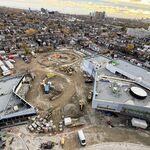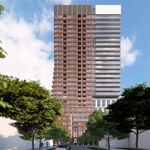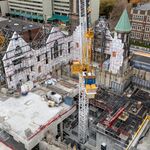Article: "Suburbs sold as hedge against disaster"
From:
www.thestar.com/NASApp/cs...9048863851
__________________________
Suburbs sold as hedge against disaster
Some downtown firms taking back-up office space in 905
`Hot seats' offer protection from terrorists or catastrophe
Apr. 22, 2006. 09:46 AM
DAVID BRUSER
BUSINESS REPORTER
The suburbs, known for box stores, sprawling subdivisions and strip malls, are now being sold as a geographic hedge against a terrorist attack or other office-crippling disaster.
Mississauga-based Fusepoint, along with Q9 Networks, is already known as a major player in the business of helping firms run their information-technology infrastructures.
But Fusepoint is now offering what it calls a "hot seat," or remote office for rent, from an 85,000-square-foot headquarters on Millcreek Dr., west of Erin Mills Parkway. The premise: businesses in Toronto's heavily populated downtown are arguably more at risk from various threats, and the 905 area offers relative safety and security.
"I think that's common logic," said George Kerns, Fusepoint's president and chief executive officer. "If somebody was going to do something, a premeditated (act) that none of us wants to think about, it's most likely to happen in a densely populated city centre."
The building, once owned by the Toronto Dominion Bank, is outfitted with bullet-proof glass near the reception desk and has boulders on the lawn to slow any vehicles barrelling in.
"If you're in the middle of a crisis, you're looking for a dependable space," Kerns said. "Our building has a lot of security protection. Buying a former bank building was a good thing to do."
The 25-seat area, built a few months ago, offers desks, phones, computers, Ethernet connections and printer — enough for a skeleton crew to carry out a company's basic, critical functions.
Backing up data is only half of a disaster-recovery plan, Kerns said.
"The other part of the equation (that) I think people forgot about: What about my people? If, for some reason, there was some kind of dirty bomb set off downtown, and people could not (be) downtown for I don't know how many days, what would they do?"
Some might try to work from home. Kerns's scenario, however, could include widespread utility failures. But Fusepoint can operate on backup power, if need be.
The sideline business is available only to current Fusepoint customers with IT infrastructure already fully or partly managed at the Mississauga site.
"Now that we have this facility in place, part of our sales process is to introduce that" to customers, Kerns said, but added, "This is not hotel property where you can call up and make a reservation. We see this as complementary to other things we're doing for people."
A customer can reserve a seat for a "nominal fee" of less than $100 a month. If a disaster strikes, the seat becomes available to the renter for several hundred dollars a day. Richard Barnowski, president of Equity Transfer Services Inc. on Adelaide St. W. in Toronto, said his company rents five of the 25 seats at Fusepoint.
"We do back-office operations for the securities industry. We need an alternative site outside the downtown core if there was a flood on this floor, if there was a fire, if there was a blackout," he said. "Our clients require shareholder lists, information about their shareholder base. We're under a tight time frame."
Barnowski added that many of his competitors operate within a six-block radius, and most have offices in different cities that can take on more work if a downtown Toronto office goes down. Barnowski does not.
"If I'm down and they're up, I'm in jeopardy," he said.
Q9 Networks chief executive Osama Arafat said his firm's Brampton office has rented out seats since the 2003 blackout on a dedicated basis, as opposed to a "shared risk" model, which he said could leave a hot-seat renter without an office space during a desperate time.
"We don't believe in overselling. The premise (behind the shared-risk model) is the disaster is going to affect only one company at the time. But it doesn't always tend to be that way."
But Fusepoint said the company also rents a few more expensive dedicated seats to a few firms. Such seats can be used by one renter and no one else. Fusepoint also said it can ramp up operations to meet an increased demand for shared hot seats with fully equipped mobile trailers.







